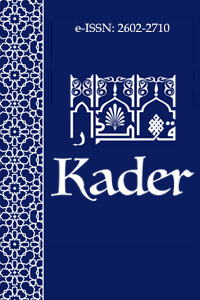Abstract
Bu çalışmada Muʻtezile’nin Allah’ın yapması vâcip olan (vücûb alellah) birtakım fiilleri olduğu iddiası ele alınmıştır. Bu iddianın tutarlılığı, diğer kelâmî ekollerin itirazları da dikkate alınarak incelenmiştir. Ayrıca Muʻtezile içinde, Allah’a vâcip kabul edilen fiillerin neler olduğu hususunda ortaya çıkan ihtilaflar üzerinde durulmuştur. “Vücûb alellah” düşüncesinin temelleri ile ilgili bölümde, vücûb kavramı analiz edilmiş ve Muʻtezile’nin Allah hakkında vücûb lafzını kullanmasında, onların bu kavrama verdiği anlamın önemli bir etkisi olduğu görülmüştür. Vücûb; aklî, metafiziksel ve ahlâkî türleri bakımından incelenerek her bir vücûb türünün Allah hakkında geçerli yönleri ele alınmıştır. Muʻtezile’nin “vücûb alellah” düşüncesini temellendirdiği aklî yöntem olan “şâhidden gâibe istidlal” üzerinde durulmuş, ayrıca onların bu hususta delil gösterdiği semʻî referanslar da incelenmiştir. Ehl-i Sünnet’in bu düşüncenin temellendirilmesinde kullanılan “şâhidden gâibe istidlal” yöntemine iki açıdan itiraz ettiği görülmüştür. Birincisi, yöntemin epistemolojik değeri ile ilgilidir. İkincisi ise onların, vücûbu gâibde kullanmaya uygun bir kavram olarak görmemeleri ile ilişkilidir. Ayrıca Ehl-i Sünnet bu konuda Mu’tezile’nin referansta bulunduğu ayetleri de onlardan farklı şekilde yorumlamıştır. Muʻtezile’nin Allah hakkında vücûb fikrine ulaşmasında, Allah tasavvurunun önemli bir etkisi olmuştur. Bu nedenle onların, Allah’ın zâtî ve fiilî nitelikleri ve bu niteliklerin ilâhî zâtla ilişkisini nasıl izah ettikleri “vücûb alellah” düşüncesi açısından ele alınmıştır. Muʻtezile âlimleri, mahiyeti zâtının aynısı olan bir Allah tasavvuru ortaya koymuş ve Allah’ın temelde, mahiyeti açısından bir vücûbiyet içinde bulunduğunu ileri sürmüşlerdir. Böylece onlar, ilâhî fiillerin gerçekleşmesinde harici bir gerektiricinin değil, zâtî niteliklerin ve bunlarla bağlantılı olarak Allah’ın sahip olduğu fiilî niteliklerin belirleyici olduğunu ileri sürmüşlerdir. Muʻtezile, zâtî ve fiilî niteliklerin ilâhî fiiller üzerindeki bu belirleyiciliğini vücûb lafzıyla ifade etmiştir. Bu şekilde onların, aklî bir çıkarım olarak ulaştıkları “vücûb alellah” düşüncesinin, ilâhî zâtın mahiyetini tasavvur biçimiyle yakından ilişkili olduğu gözlemlenmiştir. Mu‘tezile’nin, Allah hakkında vâcip kabul ettikleri fiilleri genel olarak yaratma, teklif ve temkîn konularıyla ilişkilendirdikleri görülmüştür. Ancak bu hususların tamamında Muʻtezile âlimleri hemfikir değildir. Ekol içinde ortaya çıkan teorik farklılıklar, Allah hakkında vâcip kabul edilen fiillerin neler olduğu hususundaki görüşleri de etkilemiştir.
Keywords
References
- Kaya, Sibel. Mu'tezile'de "Vücûb alellah" Düşüncesi. Kayseri: Erciyes Üniversitesi, Sosyal Bilimler Enstitüsü, Doktora Tezi, 2020.
Abstract
In this study, the claim of Muʻtazila supposing that God has some obligatory actions (wujūb ‘alállāh) to do is investigated. The consistency of this claim is examined considering the objections of other kalām schools. Also, in Muʻtazila, controversies about which actions are accepted as obligatory of God are reviewed. In the chapter regarding the bases of the idea of “God’s obligation”, the concept of “obligation” (wujūb) is analyzed and it is seen that in the usage of the word “obligation” for God by Muʻtazila, the meaning given to this concept by them has an important effect. Examining “obligation” in terms of its types, i.e., rational, metaphysical and moral, the valid aspects of each “obligation” type about God are discussed. “İstidlâl bi al-shâhid ‘alâ al-ghâib” (the deductive of the unseen through observation) which is a rational method that Muʻtazila grounded the idea of “obligation of God” is investigated and, additionally, the apocalyptic (semʻî) references that they provided as a proof on this issue are examined. It is seen that the Ahl al-Sunnah objected to the method of “İstidlâl bi al-shâhid ‘alâ al-ghâib” used in grounding this thought in two aspects. The first aspect concerns the epistemological value of the method. The second is related to the fact that they do not see “obligation” as a suitable concept for the unseen. In addition, Ahl al-Sunnah interpreted the verses to which Mu'tazila referred in this regard differently from them. Their understanding of God had a crucial effect on Muʻtazila's reaching the idea of “obligation of God”. Therefore, how they were explaining God’s essential and actual attributes and the relationship of these attributes with the divine essence ise studied in terms of the idea of “obligation of God”. Mu’tazila scholars put forward an idea of God, whose nature is the same as His essence and they argued that God was essentially under obligation with regard to his nature. Thus, they argued that not an external obligation but God’s essential attributes and His fi’ilî attributes in connection with the essential ones are decisive in the realization of divine acts. Muʻtazila expressed this decisive role of essential and fi’ilî attributes over the divine acts with the term “obligation”. Thereby, it is observed that the idea of “obligation of God” which Muʻtazila reached as a conclusion of rational inference, is closely related to the image of the nature of divine essence. It is seen that the acts accepted as obligatory about God, in general, are related with the concepts of creation, religious responsibility (taklīf) and temkîn (providing for responsible people in religious terms/mukallef bih) by Muʻtazila. However, Muʻtazilī scholars do not completely agree on all these matters. The theoretical differences emerging within the Muʻtazilī schools also affected the opinions about which acts were accepted as obligatory for God.
References
- Kaya, Sibel. Mu'tezile'de "Vücûb alellah" Düşüncesi. Kayseri: Erciyes Üniversitesi, Sosyal Bilimler Enstitüsü, Doktora Tezi, 2020.
Details
| Primary Language | Turkish |
|---|---|
| Subjects | Religious Studies |
| Journal Section | Summaries of Doctoral Dissertations |
| Authors | |
| Publication Date | December 31, 2021 |
| Submission Date | September 22, 2021 |
| Acceptance Date | December 1, 2021 |
| Published in Issue | Year 2021 Volume: 19 Issue: 2 |
Cite

Kader Creative Commons Atıf-Gayriticari-Türetilemez 4.0 Uluslararası Lisansı ile lisanslanmıştır.


